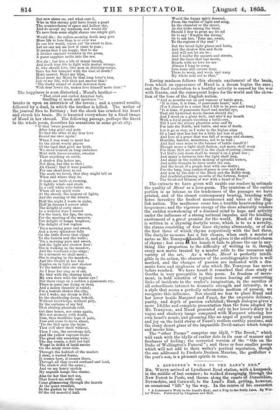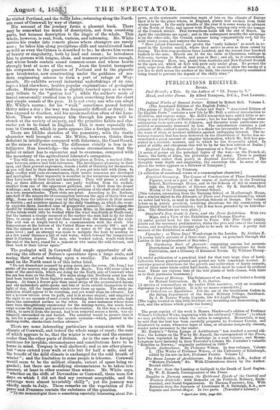A. LONDONER'S WALK TO THE LAND'S END..
Ma. Nairn arrived at Lyndhurst Road station, with a knapsack, in the middle of last summer; he walked divergingliy through the New Forest to Poole, and thence along the coasts of Dorsetshire, Devonshire, and Cornwall, to the Land's End, getting, however, an occasional "lift" by the way. In the course of his excursion ! A Londoner's Walk to the Land's End; and a Trip to the Wily Isles. By Wal- ter White. Published by Chapman and Hall.
he visited Portland, and the Se51y Isles ; returning along the North- ern coast of Cornwall byway of change.
His account of the journey forms a pleasant book. There may be somewhat too much of description, not from overdoing parts, but because description is the staple of the whole. This whole, however, is real, fresh, various, and informing. Mr. White carries his reader into remote places where strangers are rarely seen; he takes him along precipitous cliffs and uncultivated lands as wild as even the Crimea is described to be; he shows him scenes of beauty or singularity, both by land and ocean ; he introduces him to persons with tongue, ideas, and manners primitive enough, but whose heads contain sound common-sense and whose hearts strongly beat at news of the war. Anon the tourist transports his companion to the quarries of Portland and to the gigantic new breakwater, now constructing under the guidance of mo- dern engineering science to form a port of refuge at Wey- mouth. He exhibits several industrial undertakings of an ana- logous kind elsewhere, besides popular explanations of geological effects. History or tradition is slightly touched upon as a neces- sary tribute to the "genius loci"; while the author's mode of travel occasionally enabled him to glean something from the short and simple annals of the poor. It is not every one who can adopt Mr. White's course; for his " walk " sometimes passed beyond thirty miles a day ; the way was frequently difficult or dizzy ; he was exposed to weather, and his accommodation often of the hum- blest. Those who accompany him through his pages will be struck at the variety of scenery, and the primitive habits and cha- racter yet to be found in England. This is more especially the case in Cornwall, which in parts appears like a foreign country.
There are lifelike sketches of the peasantry, with the rustic character well brought out. Mr. White, however, thinks them deficient in intelligence compared with fishermen, the Coast Guard, or the miners of Cornwall. The difference strictly is less in in- telligence than knowledge—the various circumstances that the sailor or miner has to encounter and to overcome, compared with the monotony of the agricultural labourer's occupation. "You will see, as you saw in the market-place at Truro, a marked differ- ence between millers and field-labourers. The intelligence gleaming in their eyes, and their general expreasion, denote a habit of thinking for themiaelves, as you will find by their shrewd remarks, if you get into talk with them. In
• daily conflict with rude circumstances, their native resources are developed and multiplied. Their ingenuity is manifest in the numerous improvements they have made in their tools and machinery. They will pierce a shaft two or three different divisions : one party working from the surface, another from one of the uppermost galleries, and a third from the deeper workings ; and, when complete, the several portions of the shaft shall all meet in a true perpendicular. Their risks are great. According to Dr. Barham, one-half of the miners die of consumption between the ages of thirty-five and fifty.: Some are killed every year by falling. from the ladders in their ascent or descent ; and numbers maimed by the daily blastings, in which the coun- ty explodes three hundred tons of gunpowder annually, In Give.tviap the d.eaths by violence are one in five. In Union Mine, in the same parish, one eft he. levels could only be worked when the wind was South or South-east; but the instant a change occurred at the surface the men had to fly for their lives, to escape a deadly gas that then issued from the fissures of the rock. The evil was at length cured by a communication with the shaft. The temperature at the bottom of the United Mines was recently 1040; and in this the miners had to work. A stream of water at 98* ran through the same level ; and an attempt was made to mitigate the heat by sending in at a few yards' distance a fall of cold water, which lowered the temperature near it fourteen degrees. The men, who worked naked, would rush from the and of the level, stand for a minute or two under the cold torrent, and then back to their labour again."
The geologist will in Cornwall find ample opportunity of ob- serving the effects of Nature's operations -upon a large scale, and seeing. their actual working upon a smaller. The advance of
sand on the North coast is of this latter kind. -
"Do not disenchant yourself by going down into the town, [St. Ives,] but strike off the nearest way along the cliffs for Hayle. You will come 'close to some of the sand-hills, which are doing for the North side of Cornwall what the sea has done on the South. For miles along this Northern coast has the land been buried by these fugitive sands, together with churches, fields, and houses. At times a fiercer gale than usual strips off the accumulated layers, and old melancholy gable-peaks and bits of walls exhibit themselves to the light of day, till the impatient winds cover them up again. The Bandy in- undation would appear to be resistless, and yet water stops its advance. Let but a narrow stream cross its path, and it is at once stayed; and singular is the sight to see mounds of sand closely bordering the brook on one side, high above the untouched surface on the other. In some instances where dams have been thoughtlessly constructed for the mining-works, the sands have crept across the stream and onward over the country. In this way a church, which, to save it from the inroad, had been removed across a brook, was ul- timately encroached on and buried. The mischief would be greater than it is, but for a species of grass—the arundo arenaria—which, planted in the shifting drifts, checks their farther advance."
There are some interesting particulars in connexion with the climate of Cornwall, and indeed the whole range of coast; the sum of which appears to be, that the winter is warmer and the summer cooler than the other parts of Britain. As in the case of a foreign residence for invalids, circumstances and constitutions have to be borne in mind. Torquay is well sheltered ; and so are other places; but "once extend your walk or ride but for half a mile, and all the benefit of the mild climate is exchanged for the cold breath of Winter"; and the limitation to some people is irksome. Cornwall would seem to be the mildest climate, extent of space being re- garded; but there are modifying circumstances to be taken into account, at least in other seasons than winter. Mr. White says, "'whether on the cliffs of Devonshire or Cornwall, there were few days on which I did not find my overcoat acceptable, and the evenings were almost invariably chilly "; yet his journey was chiefly made in July. These remarks on the vegetation of Pul- pert° and Penzanee contain the substance of the question. To the meteorologist there is something especially interesting about Pal- perro, as the systematic researches made of late on the climate of Europe show it to be the place where, in England, plants Snit awaken from their winter torpor. In the early months of the year it is some weeks 'in advance of the North of Italy, and agrees with Naples, varying only with the temper of the Cornish winter. This forwardness holds till the end of March. In
April the conditions are equal; and in the subsequent months the advantageis on the other aide, the Cornish summer being comparatively cool, till the mild winter comes and restores the balance. •
"Here [about Penzance] are grown the early kidneys' so much in re- quest in the London market, where they arrive as soon as those raised by forcing. The first crop produces three hundred, and the second four hundred bushels to the acre. Brooch are fit for the table at Christmas, cabbage in February, turnips in March, and peas in May ; and all, be it remembered, without forcing. Here, too, plants from Australia and New Zealand flourish in the open air, which at Kew will grow only under glass. To protect the early crops from the effect of hoar-frost, it is usual to allow the smoke of a low fire to drift across the surface of the field, the current thereby established being found to prevent the deposit of the chilly rime."



























 Previous page
Previous page